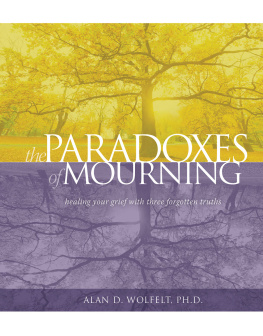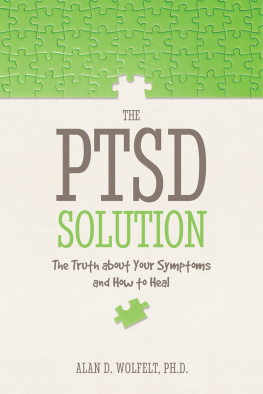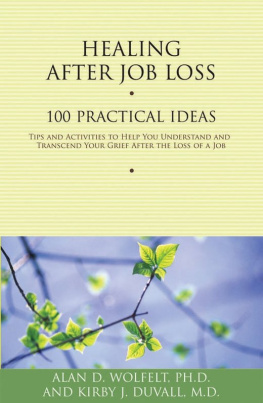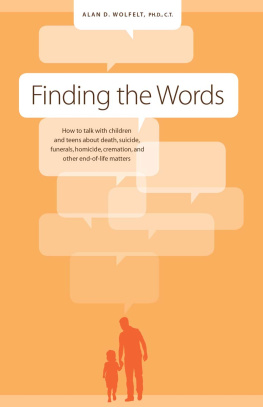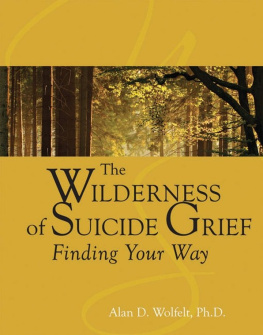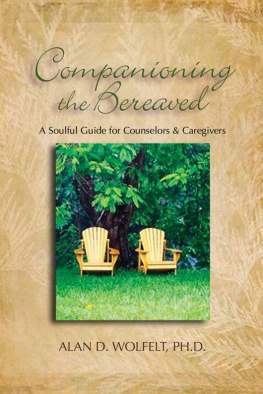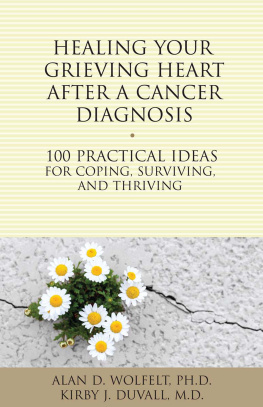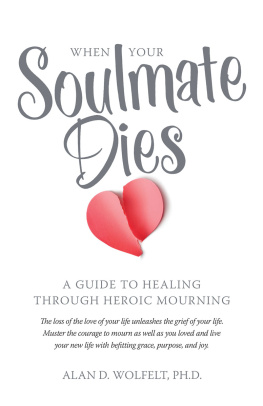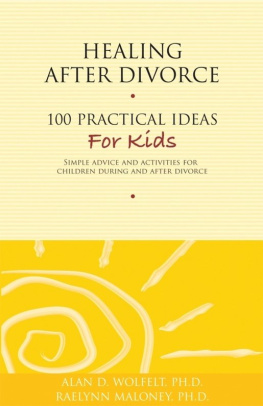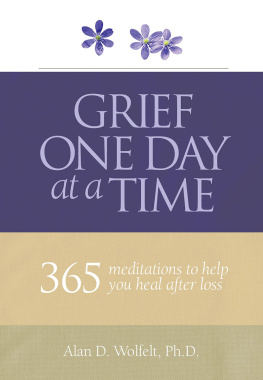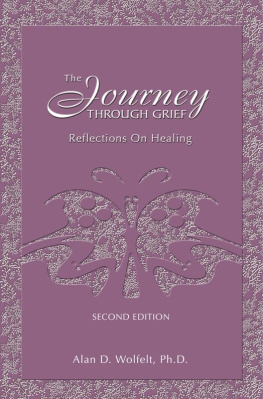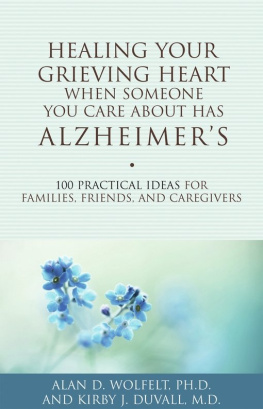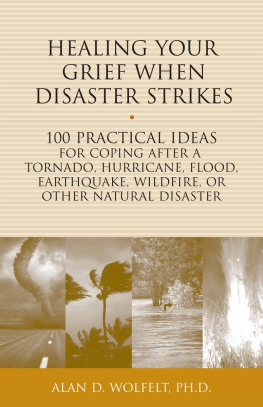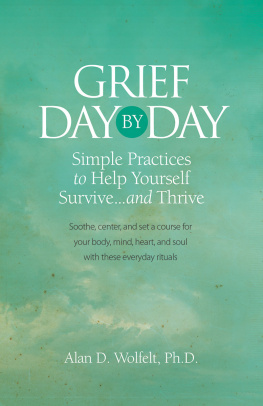
ALSO BY DR. ALAN WOLFELT
Healing Your Grieving Heart:
100 Practical Ideas
Loving from the Outside In, Mourning from the Inside Out
The Journey Through Grief:
Reflections on Healing
The Mourners Book of Hope: 30 Days of Inspiration
Understanding Your Grief:
Ten Essential Touchstones for Finding Hope
and Healing Your Heart
Companion Press is dedicated to the education and support of both the bereaved and bereavement caregivers. We believe that those who companion the bereaved by walking with them as they journey in grief have a wondrous opportunity: to help others embrace and grow through griefand to lead fuller, more deeply-lived lives themselves because of this important ministry.
For a complete catalog and ordering information, write, call, or visit:
Companion Press
The Center for Loss and Life Transition
3735 Broken Bow Road, Fort Collins, CO 80526
(970) 226-6050
www.centerforloss.com

2015 by Alan D. Wolfelt, Ph.D.
All rights reserved. No part of this publication may be reproduced, stored in a retrieval system, or transmitted in any form or by any means, electronic, mechanical, photocopying, recording or otherwise, without the prior permission of the publisher.
Companion Press is an imprint of the Center for Loss and Life Transition,
3735 Broken Bow Road, Fort Collins, Colorado 80526.
21 20 19 18 17 16 15 5 4 3 2 1
I SBN: 978-1-617222-22-1
To the children, teens, adults, and families who have invited me to walk with them through the wilderness of their grief. Thank you for teaching me about the wisdom of the three Truths explored in these pages. You helped me be a responsible rebel and question the medical model of grief care. I am forever grateful to you for enlightening me as you entrusted me with your sacred stories of love and loss.
CONTENTS
The more we know, the more we may be humbled by our ignorance to the point of illumination.
Thomas Moore
INTRODUCTION
WELCOME TO THIS EXPLORATION OF THE PARADOXES OF MOURNING. As you know, a paradox is a seemingly self-contradictory statement or situation that is in fact often true. The three paradoxes of mourning we will consider together in this book might, at first glance, seem self-contradictory, but as I will reveal, they are actually three forgotten Truths with a capital T. Theyre Truths we must rediscover. Digging them out from the cultural basementwhere we in the twenty-first century have stowed them away like Grandmas old furniturethen lovingly dusting them off and learning to appreciate them anew is a task that really cant be put off any longer. Why? Because they are essential to healing in the aftermath of significant loss.
Paradoxes are head scratchers. They often sound like puzzling tricks. The three we will review in the pages that follow have the seesaw of oppositional language: hello/goodbye; darkness/light; and backward/forward. But I hope to share with you the wisdom they containnot playground games or trickery at all but instead good old-fashioned common sense.
Yes, sometimes old-fashioned trumps newfangled. Those who have walked the Earth before us have much to teach us about the best possible future, especially when it comes to the mysteries of life and death. Progress is truly wonderful, but here in the Information Age we too often mistake efficiency for effectiveness, and we are also too quick to write off ancient traditions and customs as archaic nonsense.
Knowledge searches out and is fascinated with the new. Wisdom assumes the connectedness of reality, encouraging mindfulness of the old; it tends to prefer that which has endured the test of time.
Ernest Kurtz
I am calling the three paradoxes in this book forgotten Truths because humankind used to know and honor them. In the many long centuries in which death was ever-present (before the twentieth centurys remarkable medical advances), life was shorter but slower paced, and religious/spiritual health reigned supreme, we understood and lived the paradoxes. In fact, it is only our modern worldview that makes them seem like paradoxes at all. In the past they would simply have been life assumptions, as obvious and self-explanatory as the importance of hand washing or the fact that computers make life easier are to us today.
Before we get started, I want to clarify a couple of other key terms. When we hear the word grief, we tend to think of death. Yes, grief is what we feel after someone we love dies, and many of you reading this book are doing so as a means of support through your bereavement. Im so glad youve found this resource because, as a longtime grief counselor and educator, I truly believe it will help you in your journey through grief. But as you read, I also invite you to consider that we experience grief after all significant losses. Grief is what we think and feel whenever something we value is harmed or taken away. And so, we grieve after divorce. We grieve when we are diagnosed with cancer. We grieve when our children grow up and move away. We grieve all the time, because life is replete with transitions and losses.
Mourning, on the other hand, is expressing our grief. Its grief gone public. Grief is internal, while mourning is external. The paradoxes we will explore in this book affect both grief and mourning. But mourning, as you will see, is the key to healing.
No matter which loss(es) you may have suffered, no matter how recent or how distant your significant losses, no matter your age or background or experience, if you are grieving, this book is for you. I feel honored to pull back the curtains and reveal the three paradoxical Truths of mourning to you, and I thank you for entrusting me with your time and attention. Godspeed.

May 2015
A NOTE TO BEREAVEMENT CAREGIVERS
IF YOUR LIFES CALLING INVOLVES HELPING PEOPLE WHO ARE GRIEVING, this book affirms the importance of your work. Mourners need you now more than ever. In days past, we as a culture embraced and lived the paradoxes of mourning. Our rituals and customs supported people through the natural and necessary process of mourning. But as we have lost wisdom about grief and the need to mourn, the application of the medical model of bereavement care has us trying to push the mourner forward with cure instead of care.
Cure means to eradicate an illness. But grief is not an illnessit is a normal response to a spiritual injury. Care, on the other hand, is being present to, suffering with, and feeling with. Cure also means to change. Caregivers often want to bring about change in peoples lives. But cure can potentially damage if it does not grow out of care. Care is anchored in compassion and recognizes that this person who is hurting is my fellow human being, my brother or sister, mortal and vulnerable. And grief can never be eradicated, gotten over, or recovered from. It can only be experienced and, through active engagement, reconciled.
When care is our priority, there is hospitalitywhat Henri Nouwen described as a sacred space where a stranger becomes a friend. As fellow beings, we dont cure but we can always care. An essential part of caring is honoring the paradoxes explored in this book. Our training puts us at risk for getting the paradoxes backward. ). And whether you are a professional caregiver or a volunteer, I thank you for the critical work you do to help your fellow human beings.

